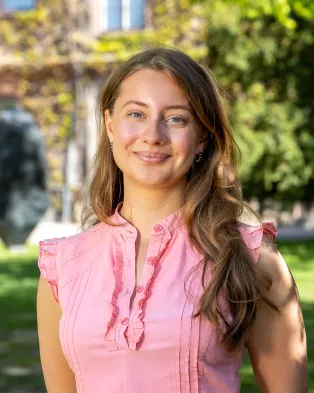Meet Edwina Magnus from Sigtuna, Sweden
What is your educational background?
I studied the IB diploma programme in High School which inspired me to study my bachelor’s degree overseas. I chose to move to the United Kingdom after graduation from high school and to study a bachelor’s degree in law at the University of Edinburgh.
How did you find our master’s programme?
Despite moving to the United Kingdom, I still felt that I wanted my law degree to have a connection to Sweden, so if I chose to move back home, I would be able to work as a lawyer. I chose therefore to do my ERASMUS exchange at Lund University, and it was during that time I discovered the Master’s programme in International Human Rights Law.
What was it like to apply for our master’s programme?
I was familiar with the application system and therefore the application process went smoothly for me. I made sure to ask for my desired references months in advance to give them time to write a solid reference for me. The same went for my statement of purpose. I also found the programme coordinators in Lund easy to reach during the application process and they were happy to help.
How was your move to Lund?
My move to Lund was smooth. I moved in with my partner who was already based in Lund studying at the Faculty of Engineering to become an engineer. I had already spent a year in Lund previously and therefore had no problem finding my way around.
My best tips when moving to Lund is to arrive a few weeks before the semester begins to settle in, begin to get to know your neighbourhood and furnish your space to make it feel comfortable before the semester begins. Lund is also beautiful at the end of the summer.
How was the process of finding housing in Lund?
My partner and I had been in the queue for Hyresgästernas Sparkasse- och Byggnadsförening (HSB) many years, and it was through HSB we found our flat.
How is the study environment at the programme?
The study environment at the programme is fantastic. All students on the programme are ambitious and supportive, all teachers and staff are helpful and inspiring, and the environment itself is calm.
The Raoul Wallenberg Institute Library is a great resource, a lovely place to study, and a social hub for the students on the programme.
How many lectures and seminars do you have on a weekly basis?
It varies slightly, but approximately six hours of lectures/seminars a week.
What is the most challenging, and what is the best thing with your programme?
The most challenging thing about the programme is thinking about what I want to do once the programme is over. International Human Rights Law is a broad programme, which is fantastic because it means that we as students are exposed to many different fields. However, it can be difficult to begin to narrow down which fields that interest you most and begin to pursue a potential career path. The best thing about the programme is that the professors are extremely inspiring and represent a mix of both academics and practitioners. From my experience the programme also allows for a healthy work life balance. The workloads are manageable, and I am therefore able to balance my studies with a part time job and being active in student associations.
How does studying here in Lund differ from studying in your home country?
Sweden is my home country, but Lund definitely differs from studying in Edinburgh as I did during my bachelors. Lund is a small town, very much centred around university life, it provides a safe and fun environment for all students.
What is it like to live in Sweden?
I love living in Sweden and was excited to come back home after studying in the United Kingdom. The standard of living is very high, even for students who live on a small budget. If you can accept the long winters we have, Sweden is a fantastic country to live in.
How do you experience the student life in Lund?
Student life in Lund is unparalleled. The university has such a strong culture of student organisation and there is an abundance of well-run student associations which are free to join: nations but also academic, sport, politics, and cultural organisations.
What are your career goals after your graduation?
It is hard to say!
I am very much interested in further research, perhaps pursuing a PhD in international law.
I am however also interested in international relations and diplomacy; I will see where the opportunities take me.
Do you have any tips for prospective students coming to Lund?
My top tips are to move to Lund during the summer before your degree starts. Lund is gorgeous in the summer, and you will feel much more confident and settled if you know your way around before the semester begins. Also, to be active and outgoing at the beginning of the semester when student organisations do most of their marketing and recruitment of members, you will be able to explore all the associations Lund has to offer outside of your studies. Finally, make the most out of the academic resources Lund offers, outside of class it is common for student organisations or academics to host lectures and seminars on interesting topics. They are often really inspiring when choosing a future career.
